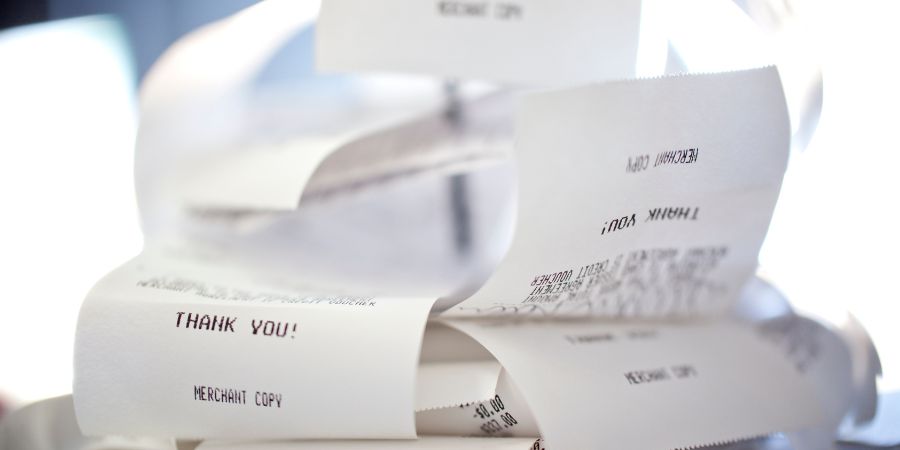When you deduct business expenses on your income tax return, you can usually refer to your records to support the expense. However, you must keep records that meet IRS record-keeping standards in case of an audit. We aim to explain what receipts the IRS requires so that you don’t miss anything when filing your taxes.
The IRS will probably ask for a receipt or another expenditure record if you use cash for business expenses other than wages, depreciation, or car expenses. The rules are more lenient if your business is a sole proprietorship, and all its expenses are subject to the personal property deduction. Here are some of the most important receipts you should keep for your business.
Receipts for All Business Expenses Over $75
The IRS requires a written record of all business expenses exceeding $75. In most cases, you must have a receipt for these expenses.
- If you make a payment that does not require a receipt, you should keep a written record of the payment. The written record can include a computer log, a spreadsheet, or a diary. It must show the payment amount, the business reason for the payment, the business name and address (if different from your own), the date of the payment, and the name of the person or company that you made the payment to.
- Keep records of all expenses relating to your automobile, such as gasoline, oil changes, repairs, insurance, tires, and maintenance. Business miles driven should be kept separate from personal miles driven. If you drive a car that you own, you can deduct the business miles driven and your actual expenses (gasoline, oil changes, repairs, and maintenance). If you drive a car that you lease, the lease payment and business miles are considered a business expense. If you drive a vehicle that you rent, you can deduct only the business miles driven.
- Keep records of all expenses relating to your home office, such as electricity, heating fuel, cleaning supplies, telephone, internet, and insurance. You can also deduct the cost of a separate telephone line with a business message on your voicemail. If you have a home office, you must determine whether the office is a deductible expense.
Travel and Entertainment
The IRS requires receipts for travel and entertainment (T&E) expenses, such as airfare, hotel bills, meals, and car rentals. The rules are different if the T&E is associated with a business event that meets one or more of the IRS’s T&E rules.
You do not need a receipt to support the T&E expense in these cases. Instead, you must keep a log of the expenses and the business reason for the T&E. You must also keep track of the business purpose, who was present at the event, how much each person spent, and how long the event lasted.
Advertising and Marketing
The IRS requires receipts for all advertising and marketing expenses and some research and development costs. Advertising and marketing expenses include the cost of printing, designing, and mailing promotional materials such as brochures, catalogs, and newsletters.
These also include the cost of internet advertising, website design, and fees for public relations and advertising consultants. Research and development costs include the cost of product testing and experimentation to determine if there is a need for new products and the level of customer demand for existing products. They also include the cost of developing prototypes and formulas.
Depreciation
Businesses that use an accrual method of accounting must keep all records. Depreciation records must show the date the equipment was placed in service, the equipment’s original cost, and the depreciation amount each year.
If your business owns its assets, you must depreciate them over a certain period. Real estate records must show the date you purchased the property and the amount of any mortgage. You must keep records of the cost of improvements and repairs to the property.
Business Gifts
The IRS requires receipts for all business gifts. Keep records on the following:
- The date and location of the gift
- The name of the person receiving the gift
- The value of the gift
- The name of the person who gave you the gift
- The business reason for the gift
- The business relationship with the person giving you the gift
If you receive a gift, keep records of the gift, the business reason for the gift, and the business relationship with the person who gave you the gift. You must report gifts of more than $25 on your income tax return.
Computer Equipment and Software
Businesses that use computers to process their financial data or orders of products and services must keep records of the acquisition cost and depreciation. Computer-related expenses that can be deducted from your income tax return include the cost of:
- Computers
- Printers
- Modems
- Software
- Internet service
- Repairs, upgrades
- Depreciation
These also include monthly payments for a computer and internet service, computer repair fees, and computer rentals for employees who do not have their own computers. For any software titles, it is best to also add a note as to what it was used for and who used it, in case you ever need to know down the line.
Office Supplies
Keep records of the purchase price of all office supplies that you deduct on your income tax return. These include paper, pens, pencils, notebooks, file folders, cleaning supplies, toner for printers, pens, pencils, paper clips, and computer paper and toner.
Warranties for office equipment such as computers and printers are also deductible. You can also deduct the cost of copying and printing services.
Mileage and Vehicle Maintenance
Keep records of all vehicle-related business expenses, such as gasoline, new tires, oil changes, necessary repairs, insurance, and all vehicle maintenance. Also, keep records of the business miles driven.
You must keep a mileage log for each business trip and every business-related trip from home. You must report all business miles driven on your income tax return.
Outsourced Assistance for Your Business
The IRS requires receipts or written records for all out-of-pocket expenses. You also must keep records of any payments made to independent contractors or outsourced service providers.
In addition to written records, you must maintain a written contract with any individual or company that you hire to perform any part of your business. Keep these records also to protect yourself should an issue come up with those contractors or providers in the future.
Let Protea Financial Help You Determine Which Receipts Are Best to Keep for Your Business
The IRS will examine your business expenses if you claim them on your income tax return. You must keep records of all business expenses to prove that they were legitimate business expenses.
Keep records in a way that makes sense to you so that you can quickly identify and locate the information when you need it. This will make tax time much easier.
You should keep these records for as long as you own the business. If you sell your business, you must keep the records for at least three years after the date you sell it.
Are you looking for more information? Contact Protea Financial today and let us help you organize your finances, straighten out your receipts, and be ready ahead of the next tax deadline.
When you contact Protea Financial, you get a team of professionals who can help you with many aspects of your financial record keeping, including knowing which receipts are best for you to keep for tax time. Call now – we are here to help!





